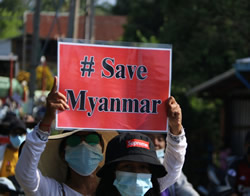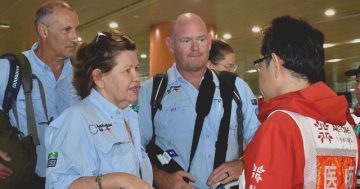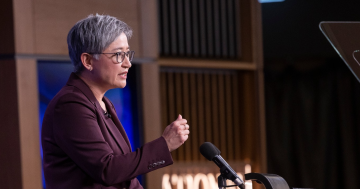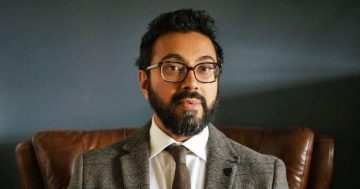Ralph Cossa* says ASEAN’s failure to make a meaningful response to the atrocities committed by the military junta in Myanmar puts into question its relevance as a viable international organisation.
 The 10-member Association of Southeast Asian Nations (ASEAN) is a consensus-based organisation that “moves at a pace comfortable to all,” which means at a pace comfortable to its slowest member.
The 10-member Association of Southeast Asian Nations (ASEAN) is a consensus-based organisation that “moves at a pace comfortable to all,” which means at a pace comfortable to its slowest member.
ASEAN also adheres to the principle of “non-interference in the internal affairs of one another”.
However, when one of its members issues orders to “shoot in the head” unarmed peaceful protesters, this goes against everything that ASEAN is supposed to stand for.
Its continued inaction in the face of the ruling junta’s assault against the people of Myanmar raises the question of ASEAN’s viability and utility.
Every ASEAN document proclaims the need for the organisation to remain “in the driver’s seat” when it comes to dealing with security challenges in the region.
The time has come for ASEAN to drive.
As Philippine Secretary of Foreign Affairs, Teodoro Locsin said in a recent tweet, the “principle of non-interference in others’ domestic affairs cannot be used to conceal crimes against humanity; that would be tantamount to ASEAN’s complicity and consent”.
In a separate post, Mr Locsin said ASEAN’s non-interference policy “marginalises ASEAN in the moral esteem of the planet and thereby sidelines it from the centrality it has long sought and attained”.
So what should ASEAN do?
For starters it can stop issuing anodyne proclamations calling for “all parties to refrain from instigating further violence, and for all sides to exercise utmost restraint as well as flexibility”, and instead address the problem head-on.
It could take as an example this statement by the Philippine Foreign Ministry.
“The Philippines is profoundly dismayed at reports of excessive and needless force against unarmed protesters,” the statement read in part.
“We reiterate our call for security forces in Myanmar to exercise restraint and desist from resorting to disproportionate force against unarmed citizens.
“We remain steadfast in supporting Myanmar on its path to a fuller democracy.”
Unfortunately, getting a consensus institution like ASEAN to issue such a public statement remains unlikely.
Nonetheless, ASEAN has at least two vehicles for delivering a quieter message to the generals.
One is via a visit by the Troika, consisting of the Heads of State of the current, immediate past, and next ASEAN Chair.
In this case that would be, respectively, Brunei Darussalam, Vietnam, and Cambodia — not the largest nor the most influential messengers in ASEAN — but the delegation could easily be supplemented with others for a more impactful effect.
There are a number of senior ASEAN statesmen who could head such a delegation.
My choice would be former Indonesian Foreign Minister, Marty Natalegawa, who would bring both personal prestige and the clout of ASEAN’s largest and most influential member to the table.
Their message should be a simple one: Immediately stop the killing of unarmed peaceful protesters or face being expelled from ASEAN.
Better yet, ASEAN should inform the junta that it is prepared to recognise the Interim Unity Government comprised mostly by Members of Parliament who were elected in last year’s democratic poll.
This prospective Government, which involves a number of ethnic parties as well as Aung San Suu Kyi’s National League for Democracy, would no doubt welcome ASEAN’s intervention.
Most importantly, ASEAN’s recognition would de-legitimise the junta, a threat they would have to take seriously.
The United States has taken a number of unilateral measures to pressure the junta to respect the people of Myanmar’s wishes.
It also needs to pressure ASEAN to do more.
One vehicle for doing so would be the Quad — Australia, India, Japan, and the United States — together with like-minded countries such as New Zealand and South Korea.
It should inform ASEAN that it will not participate in future East Asia Summit meetings as long as a junta-led Myanmar remains in the group.
This will, of course, require India to get off the fence and finally speak out in defence of democracy.
Other East Asia Summit members, China and Russia, should, but are not likely to join this effort. Both sent representatives to the junta’s Armed Forces Day parade in the midst of the civilian carnage.
The people of Myanmar will remember this.
If ASEAN was prepared to “move at a pace comfortable to none” rather than letting a single member (or two) hold the group hostage, it could finally put some meaning behind the term “ASEAN centrality”.
Right now it just means sitting in the middle of the road and going nowhere.
*Ralph Cossa is Worldwide Support for Development-Handa Chair in Peace Studies and President Emeritus at the Pacific Forum. He can be contacted at [email protected].
This article first appeared on the Pacific Forum International website.







